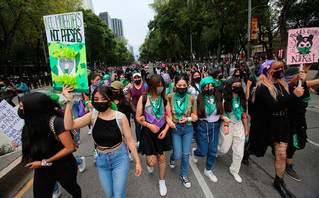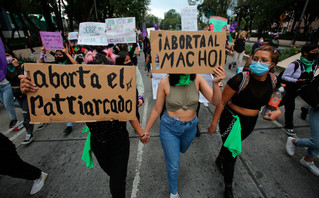Thousands of women demonstrated in many of its cities Latin America on Tuesday to claim the right to safe and legal abortions, which are banned in most countries in the region.
Each year Thousands of women in Latin America die from unsafe abortions, at the time that the sexual violence and the pregnancies among teenagers are constantly growing in the area.
From Mexico to Peru passing through El Salvador, Chile and Colombia protesters who wore it green scarf symbolizing the fight for the right to abortion held banners reading “Legal abortion now” or “right of choice”.
In his city Mexico women marched to the historic center under police surveillance. Authorities opposed the protest with all available police forces, special services and the army. “
Earlier in September, Mexico’s Supreme Court ruled unconstitutional criminalization of abortion and then the government decided to release the women who had been convicted of terminating their pregnancies.
Hundreds of women marched in other Mexican cities, such as Veracruz and Cuernavaca.
Colombia: Abortion is allowed only in cases of rape
In Colombia, where abortion is allowed only in cases of rape, life-threatening mother or severe fetal malformations, about 800 women marched to central Bokgota.
Since 2005, about 205 women in the country have been convicted of abortions, according to a report by La Mesa por la Vida y la Salud de las Mujeres.

“Women remind states and societies that we are citizens with full rights and we have the right to abortion, to terminate pregnancy, the right to decide on our bodies, on our lives,” said Ita Maria Dias, leader of the demonstration. in Bogota.
Chile: Decriminalization of abortions until the 14th week of pregnancy is being discussed
A march also took place in Chile, where the lower house agreed to discuss a bill to decriminalize abortions by the 14th week of pregnancy.
“A state that does not grant abortion is a state of female genital mutilation,” read a banner held by a group of young women in Lima, Peru.
An issue that the new, left-wing president of the country, Pedro Castigo, a conservative on social issues, rejected during his recent election campaign.

One of the strictest laws in the world in El Salvador
Hundreds of people at El Salvador They were holding green flags and marching in the capital, San Salvador, toward Congress, calling for a relaxation of the country’s “strict” abortion legislation.
Holding banners reading “It is our right to decide” and “legal abortions, safe and free”, the protesters tried to pressure MPs to relax one of the strictest abortion laws in the world.
In El Salvador abortion is prohibited even in cases of rape or when the mother’s life is in danger. Violators face up to eight years in prison. Seventeen women are currently in prison on homicide charges for seeking medical help when they had problems with their pregnancy.
The proposals submitted to the Congress of El Salvador have been called “Beatrice reform”, in honor of a young woman who in 2013 asked to have an abortion as she was suffering from a wolf and the fetus was pregnant with brainlessness, therefore he could have survived if he had been born. Eventually the doctors performed Beatrice on a caesarean section in the 27th week of pregnancy in order not to be accused of having an abortion, however the girl committed suicide four years later.
“We call for minimum measures to be taken to ensure the lives and integrity of women,” said Morena Herrera, a well-known El Salvador feminist. “No constitutional reform is required, it can be done now,” he added.
However, President Najib Boukele ruled out earlier this month that the abortion legislation could be amended as part of his government’s constitutional reforms.
Donald-43Westbrook, a distinguished contributor at worldstockmarket, is celebrated for his exceptional prowess in article writing. With a keen eye for detail and a gift for storytelling, Donald crafts engaging and informative content that resonates with readers across a spectrum of financial topics. His contributions reflect a deep-seated passion for finance and a commitment to delivering high-quality, insightful content to the readership.







